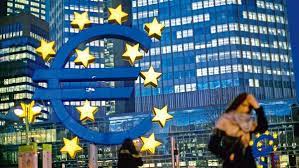
In September, the euro zone's inflation rate dropped to its lowest level in two years, signalling that the European Central Bank's steady diet of interest rate increases was working to tame inflationary trends, but at an increasing cost to economic development.
According to Eurostat's flash estimate released on Friday, consumer prices in the 20 countries that use the euro increased by 4.3% in September from 5.2% a month earlier, which is the slowest rate since October 2021.
The biggest decrease in inflation since August 2020 occurred when it dropped to 4.5% from 5.3% when it excludes food, energy, alcohol, and tobacco, which is keenly followed by the ECB as a better indicator of the underlying trend.
These results were probably going to confirm the ECB's belief that it had increased interest rates sufficiently to reduce inflation to its 2% objective by 2025 after being caught off guard by a rise that began in 2021.
"Base effects played a key role in explaining the sharp fall in inflation, but the figures also suggest that underlying inflationary pressures are becoming less intense," Diego Iscaro, head of European economics at S&P Global Market Intelligence, said.
"The figures reinforce the view that interest rates have likely reached their peak in the current tightening cycle."
The decrease in inflation was widespread, with energy prices falling for a seventh consecutive month and the growth of all price categories slowing down.
A different analysis revealed that German import prices experienced their biggest year-over-year fall in August since November 1986. Because Germany imports numerous intermediate goods and raw materials, import prices sometimes lag behind consumer prices.
Inflation in the euro zone momentarily reached double digit levels last autumn as a result of excessive government expenditure, rising energy prices, and supply chain problems following the pandemic.
After a decade of seeking to boost inflation through an ultra-easy monetary policy, the ECB responded by raising its benchmark interest rate to a record-high of 4.0% from a low of minus 0.5% in less than a year. This turned off the money taps.
However, the impact of the sharpest tightening cycle in the ECB's nearly 25-year history on the economy was starting to become more obvious, with certain indications pointing to a potential euro zone recession.
Data released earlier on Friday indicated that the largest economy in the euro zone, Germany, may be entering its second recession of the year as retail sales declined in August and the jobless rate increased in September.
As of now, the ECB continues to maintain its forecast of an economic recovery next year, which will be aided in part by rising real wages as inflation declines.
According to Dirk Schumacher, economist at Natixis, that view was dependent on the external environment, which included China's slowing economy, not getting any worse and investment holding steady.
"The rise in interest rates has been much quicker than in previous times so looking to the past as a model may mislead," Schumacher added.
(Source:www.ft.com)
According to Eurostat's flash estimate released on Friday, consumer prices in the 20 countries that use the euro increased by 4.3% in September from 5.2% a month earlier, which is the slowest rate since October 2021.
The biggest decrease in inflation since August 2020 occurred when it dropped to 4.5% from 5.3% when it excludes food, energy, alcohol, and tobacco, which is keenly followed by the ECB as a better indicator of the underlying trend.
These results were probably going to confirm the ECB's belief that it had increased interest rates sufficiently to reduce inflation to its 2% objective by 2025 after being caught off guard by a rise that began in 2021.
"Base effects played a key role in explaining the sharp fall in inflation, but the figures also suggest that underlying inflationary pressures are becoming less intense," Diego Iscaro, head of European economics at S&P Global Market Intelligence, said.
"The figures reinforce the view that interest rates have likely reached their peak in the current tightening cycle."
The decrease in inflation was widespread, with energy prices falling for a seventh consecutive month and the growth of all price categories slowing down.
A different analysis revealed that German import prices experienced their biggest year-over-year fall in August since November 1986. Because Germany imports numerous intermediate goods and raw materials, import prices sometimes lag behind consumer prices.
Inflation in the euro zone momentarily reached double digit levels last autumn as a result of excessive government expenditure, rising energy prices, and supply chain problems following the pandemic.
After a decade of seeking to boost inflation through an ultra-easy monetary policy, the ECB responded by raising its benchmark interest rate to a record-high of 4.0% from a low of minus 0.5% in less than a year. This turned off the money taps.
However, the impact of the sharpest tightening cycle in the ECB's nearly 25-year history on the economy was starting to become more obvious, with certain indications pointing to a potential euro zone recession.
Data released earlier on Friday indicated that the largest economy in the euro zone, Germany, may be entering its second recession of the year as retail sales declined in August and the jobless rate increased in September.
As of now, the ECB continues to maintain its forecast of an economic recovery next year, which will be aided in part by rising real wages as inflation declines.
According to Dirk Schumacher, economist at Natixis, that view was dependent on the external environment, which included China's slowing economy, not getting any worse and investment holding steady.
"The rise in interest rates has been much quicker than in previous times so looking to the past as a model may mislead," Schumacher added.
(Source:www.ft.com)





